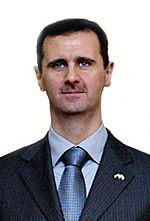Syrian protests met with crackdown
Sunday, April 17, 2011

Image: Ricardo Stuckert/ABr.
Tens of thousands of Syrians took to the streets Friday in cities across the country protesting for freedom. Syria's official news agency (SANA) reported, "scattered groups of citizens came out to the streets in several areas of the provinces after Friday prayers and chanted slogans calling for freedom without the intervention of security forces." However, protests in Damascus reportedly turned violent as security forces were said to disperse the crowds with batons and tear gas to prevent protesters reaching the capital's main square.
"I counted 15 mukhabarat [secret police] busloads," a source reported to Reuters news agency. "They went into the alleyways just north of the square chasing protesters and yelling 'you pimps, you infiltrators, you want freedom? we will give it to you'."
Protests in Syria have intensified since mid-March after families of political prisoners held rallies in Damascus and people in Daraa protested against the arrests of more than a dozen children for anti-regime graffiti. The protests continued as Syria’s President, Bashar al-Assad failed to lift the emergency law the country has operated under since his Arab Socialist Ba’ath Party came to power in 1963. The Assad government has met protests with a mixture of minor concessions and force.
After a meeting of NATO foreign ministers in Berlin, US Secretary of State Hillary Clinton said, "The Syrian government did not meet the legitimate demands of the Syrian people. It is time for the Syrian government to stop its crack down on these people and begin to meet their aspirations." Assad met with a delegation from Dara'a yesterday. The delegation asked for a deadline for their demands to be met. Al Jazeera correspondent Rula Amin said, "It seems from the people in Daraa that the government is seriously trying to contain [the situation in] Daraa because that is where it all started. If they manage to calm the situation in Daraa, the government believes it will be able to contain the situation throughout Syria."
Sources
- "Protests reach Damascus" — Al Bawaba News, April 16, 2011
- "Thousands Demonstrate in Syrian cities" — Al Jazeera, April 15, 2011
- Khaled Yacoub Oweis. "Syria protests sweep into capital, defying Assad" — Reuters, April 15, 2011
- "Assad forms new Syrian government" — Al Jazeera, April 14, 2011
- "The Arab awakening" — Al Jazeera, February 11, 2011

